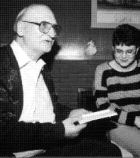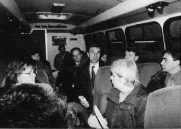

|
"Bus Rounds" |

Patient Kenneth Myers |
There's nothing unusual about seeing a bunch of people huddled in one area, bundled up to their eyeballs and waiting for a bus on a frosty Edmonton winter morning.
Look past the exhaust and ice fog, however, and you'll notice this is no ordinary bunch. And there's no bus pole in sight. This bus is idling outside the main doors of the Grey Nuns Community Hospital and Health Centre. And it's picking up doctors, nurses and medical students for their Tuesday morning "bus rounds."
It's a program unique to Edmonton. Every two weeks, from September to June, bus rounds take these health-care professionals out of hospital hallways and into the homes of cancer patients. With home care increasingly replacing continuing-care facilities and hospital care, patients are spread throughout the city. How then do physicians and nurses participate in educational rounds when patients are no longer in one building? Easy, thought Dr. Eduardo Bruera, professor of oncology in the U of A's Division of Palliative Care Medicine, we'll go to them. Bruera came up with bus rounds two years ago.
"We know the key to the delivery of good palliative care is education. The best way to educate people is based on patients in a home care environment," says Bruera. After a one year pilot project, bus rounds look like they're here to stay. "It's an opportunity to gain generalized knowledge in specific situations," says Bruera.

Dr. Eduardo Bruera (centre) with colleagues on the bus |
It works like this: a staff member selects patients willing to participate and maps out the bus route. In order to make optimum use of transportation time, journal articles and educational topics are chosen for discussion on the bus. Prior to arriving at each destination, the patient's history is outlined. After the consultation, which lasts 15 to 20 minutes, the group reassembles on the bus to discuss recommendations. The goal is to be as unobtrusive as possible for patients while still providing an educational round for health-care professionals. It's a chance to share ideas about treatments and services and ensure a consistent quality of care for all patients.
When Dr. Doreen Oneschuk first heard she had to hop on a bus for a round, she thought "Are you serious?" Now, the palliative care consultant is pleased with the success of bus rounds. "You get 10 consults for the price of one visit." It's a chance to see cases that are particularly interesting or have significant psycho-social problems, says Oneschuk, and learn about symptoms no one has ever seen before.
Patients also benefit from bus rounds in more ways than one. "A hospital is about control," says Sandy MacKinnon, manager of the palliative care unit at Grey Nuns. "Autonomy and self-determination is something we try to build with patients and being at home is about total autonomy and self-determination." Dr. Bruera says it's a way of empowering patients on a one-to-one basis.
One patient who invited a round into his home is 72-year-old Kenneth Myers. Myers carefully prepared his living room for 14 visitors. Dr. Oneschuk led the talk and when asked about his pain control, Myers produced a little blue book. It's a diary of how he manages his pain and he shared it with everyone. For Myers, it was a chance to meet people he's dealt with on the phone. For the team, it was an opportunity to see how one individual is taking control of his life.
"I intend to conquer this," he tells the team, attributing his positive attitude to how he was brought up. "When you work yourself at 70 years, to a 12 or 13 handicap in golf, you have to concentrate on winning!" he says to laughter.
A half-day of rounds can visit about four patients and cover three to eight journal articles. At $250 a round, Bruera believes it's a cost-effective educational tool and would like to see the program reach people living outside Edmonton. He's already spreading his idea around the world, returning recently from a Latin American conference in Argentina where he organized three half-days of bus rounds.
"We hope to have the next international congress in a bus depot," he says with a chuckle.
Catch "Bus Rounds" on CTV's Success Stories, Wednesday, February 4, 1998 on the 11:00 p.m. newscast.
![[Folio]](http://www.ualberta.ca/~publicas/folio/gif/small/folio.gif)
Folio front page |
![[Office of Public Affairs]](http://www.ualberta.ca/~publicas/gif/small/opahome.gif)
Office of Public Affairs |
![[University of Alberta]](http://www.ualberta.ca/~publicas/gif/small/uahome.gif)
University of Alberta |